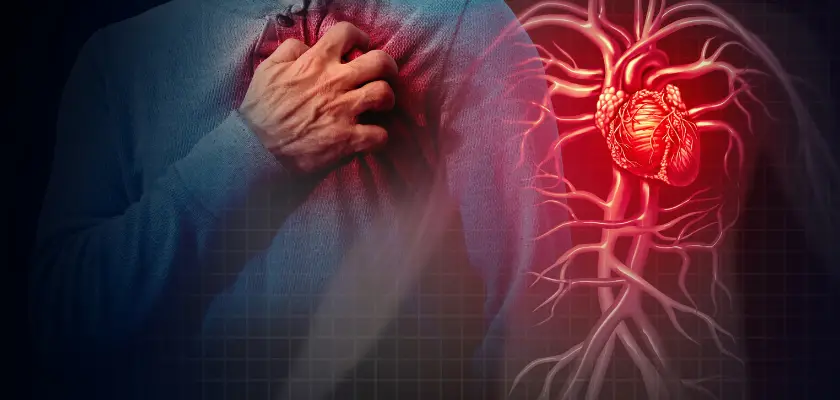Mild Heart Attack Symptoms (Silent Heart Attack) Early Warnings
Mild heart attack symptoms can vary from person to person, but some common signs and symptoms include:
- Chest discomfort: This may be described as a squeezing, pressure, tightness, or burning sensation in the chest. The discomfort may last for a few minutes or go away and come back.
- Pain or discomfort in other areas: The pain may radiate to the arms (usually the left arm but can also affect both arms), shoulders, neck, jaw, or back. It’s important to note that some people, especially women, may experience atypical pain, such as pain in the upper abdomen or unusual fatigue.
- Shortness of breath: You may feel breathless or have difficulty catching your breath, even with minimal physical exertion.
Nausea and vomiting: Some people may experience feelings of indigestion, nausea, or vomiting during a mild heart attack.
Sweating: Profuse sweating, often described as clammy or cold sweats, can occur even if you’re not engaging in any strenuous activity.
Fatigue: Unexplained fatigue or a feeling of extreme tiredness may be present, even without any physical exertion.
Light-headedness or dizziness: You may feel dizzy or lightheaded, possibly accompanied by fainting or near-fainting.

It’s important to remember that these symptoms can also be associated with other conditions, so it’s crucial to seek medical attention if you experience any of these signs.
Prompt medical evaluation is crucial to determine the cause of your symptoms and provide appropriate treatment.
If you suspect a heart attack, call emergency services immediately.
Related Articles
Pictures of swollen ankles due to congestive heart failure
Beri beri sa buntis
Why is an angioplasty an incorrect treatment for an aneurysm?
Are sock marks a sign of heart disease?
What Are Heart Stents?
Stents are metallic tubular devices that are put into the coronary arteries.
Stents are used when you have blockages in your coronary arteries. These arteries are important because they allow blood to flow freely to the heart.
When blood can no longer flow freely to the heart, heart muscle damage occurs. This is when a heart attack occurs.
The interventional radiologist will introduce the stent to the heart via the groin or the arm. Stents are safe, although there are risks associated with stents. Such as:
- Perforation of the coronary vessel
- Infection
- Reclotting
- Allergic reaction
- Anesthesia complications
- A heart attack
- Another blockage
This is what happened to Bernie Sanders. Evidently, Bernie Sanders did not have any symptoms prior to having a heart attack. However, often time people ignore the symptoms of a heart attack especially if the symptoms are mild.
In this article, we will discuss the symptoms of a heart attack that people sometimes ignore.
When Does A Heart Attack Occur?
A heart attack occurs when the blood flowing in the arteries of the heart become occluded. This can happen because of plaque or a blood clot.
When the heart cells do not get enough oxygen, the cells start to die. Heart attacks can be mild or major.
Mild heart attack symptoms do not correlate with damage.
Every 40 seconds, a person has a heart attack in America. More than 800,000 Americans have a heart attack per year.
Coronary artery disease is the main cause of heart attacks.

People at risk for heart attacks are people who:
- Smoke
- People who are overweight
- People who do exercise
- People with high cholesterol
- People with a genetic tendency
- People who have high blood pressure
Symptoms of a Heart Attack
Unfortunately, you cannot go by your symptoms on whether the heart attack is a mild heart attack or a major heart attack.
A patient will sometime present to the emergency room with signs of a major heart attack.
After further testing, it is determined that the patient did not have a major heart attack. Sometimes it is gallbladder problems or acid reflux.
Other times a patient will come into the hospital with “mild” chest pin and testing will show the person has had a major heart attack.
Some people will have what we call a “silent heart attack”. This is where people will have very mild symptoms of a heart attack or no symptoms at all.
- Shortness of breath
- Indigestion or reflux- this is symptoms is especially common in women
- Mild chest discomfort (This is what Bernie Sanders suffered)
- Chest pain
- Back pain
- Shoulder pain
- Stomach pain
- Diarrhea (common in women)
- Squeezing chest pain
- Fatigue and lightheadedness
- Sweating
- Nausea and vomiting
- Jaw pain
- Anxiety
- The feeling of impending doom
Bernie Sanders Had a Heart Attack
Bernie Sanders only had mild discomfort. Often times, people contribute to their “subtle” symptoms to indigestion and muscle strain. Is this what happened to Bernie Sanders?
- Was Bernie Sanders so involved in his work and ignored the symptoms?
- Did Bernie Sanders have any heart disease diagnosis?
- Did Bernie Sanders have high blood pressure?
As a cardiac nurse, I have also seen patients presenting with mild heart attack symptoms, and they indeed had a mild heart attack. Whenever someone has any symptoms of a heart attack, it is best to get emergency help or call 911.
Many times people go into the emergency department complaining of stomach pain, shoulder pain, left arm pain, and stomach ache. These symptoms are also signs of a mild heart attack or major heart attack.
For whatever reason, some people tend to be in denial about chest pain. Many people will say it is indigestion and take tons of acid blockers. The lesson to learn is when in doubt, seek treatment. I am glad Bernie Sanders decided to go get treatment when he did.
Mini Heart Attack Treatments
Certain treatments usually are started right away if a heart attack is suspected, even before the diagnosis is confirmed. These include:
- Aspirin to prevent further clots.
- Nitroglycerin sublingual is given to reduce the heart’s workload.
- Oxygen is administered to give the heart muscle more oxygen.
- Thrombolytic medicines, also called clot busters, are used to dissolve blood clots that are blocking the coronary arteries. To work best, these medicines must be given within several hours of the start of heart attack symptoms.
- Percutaneous coronary intervention is a nonsurgical procedure that opens blocked or narrowed coronary arteries
- Your doctor may prescribe one or more of the following medicines.
- ACE inhibitors. ACE inhibitors lower blood pressure and reduce strain on your heart. They also help slow down further weakening of the heart muscle.
- Anticlotting medicines. Anticlotting medicines stop platelets from clumping together and forming unwanted blood clots. Examples of anticlotting medicines include aspirin and clopidogrel.
- Anticoagulants. Anticoagulants, or blood thinners, prevent blood clots from forming in your arteries. These medicines also keep existing clots from getting larger.
- Beta blockers. Beta blockers decrease your heart’s workload. These medicines also are used to relieve chest pain and discomfort and to help prevent another heart attack. Beta blockers also are used to treat arrhythmias (irregular heartbeats).
- Statin medicines. Statins control or lower your blood cholesterol. By lowering your blood cholesterol level, you can decrease your chance of having another heart attack or stroke.
- Magnesium deficiency is a known cause of heart disease.
Prevention of Heart Attacks
I cannot stress the importance of maintaining normal blood pressure.
[su_note note_color=”#fde575″]A history of high blood pressure is the top predictor of developing heart disease.[/su_note]
Other things we can do now to prevent a heart attack are:
- Maintain adequate weight. There has been more research and evidence that shows that a low-carb diet will reduce your chances of getting heart disease. You see, heart disease is caused by inflammation. A low-carb diet will keep your insulin levels in “check”. Insulin is the fat-storage hormone.
- Keep Cholesterol levels “normal”. Cholesterol basically consists of HDL and LDL components. You want to keep your HDL high and your LDL low.
- Exercise daily. Thirty minutes of exercise 3 times a week has been proven to reduce your heart disease risk.
- If you have high blood pressure, and you have prescribed medications, take them. People have stopped taking their medications with just losing 5% of their body weight. The DASH diet has also been proven to reduce high blood pressure.
- Diabetes. Diabetes and high blood pressure are two diseases that will run havoc on your body if they are not controlled. These two diseases will harm every organ in the body. A low-carb or Keto diet will drop your A1C like a rock.
- Keep stress levels down. Stress is a major contributor to heart disease. Stress contributes to high blood pressure.
Bottom Line
In a recent study called the EMMACE study, 20% of patients were confirmed to have had a heart attack, and they presented without pain. This situation delays treatment and diagnosis. The patients who presented without chest pain were often older and female.
Some heart failure patients also did not have any pain. Ironically, the people who presented without chest pain had more severe left ventricle impairment than people who presented with chest pain. Patients presenting without pain were 60% more likely to die than people who presented with pain.
When in doubt, go immediately to the emergency department.



Whenever someone has plaque to the extent it could result in a heart attack, wouldn’t they show a high level of inflammation on a simple blood screen? If that is true, then early symptoms that warrant a pill for antacid or acid reflux, or even pain around the chest, could at least warrant a doctor visit demanding a test of inflammation and vitamin D deficiency, which tends to follow high inflammation. If those are bad, a smart move is to get an arterial scan for possible calcium buildup in the arteries which could confirm a higher risk of serious plaque. This way, besides some treatment, a person is better prepared to seek immediate help during a possible symptom, versus taking an OTC pill and hoping for the best.